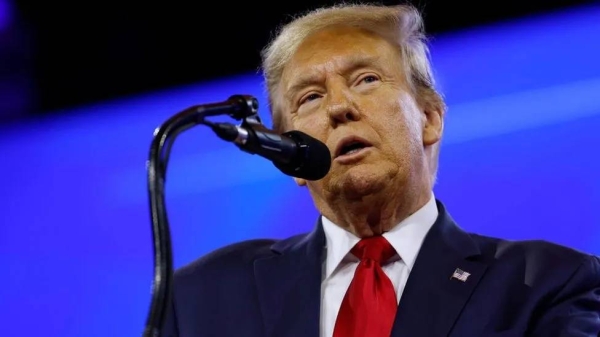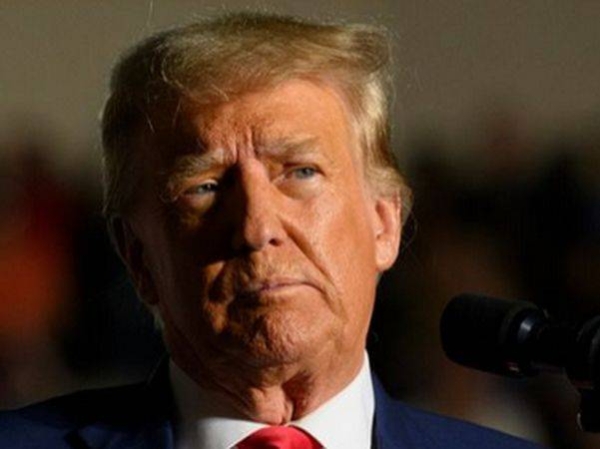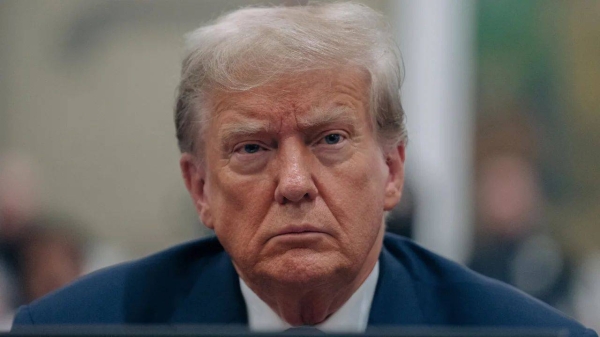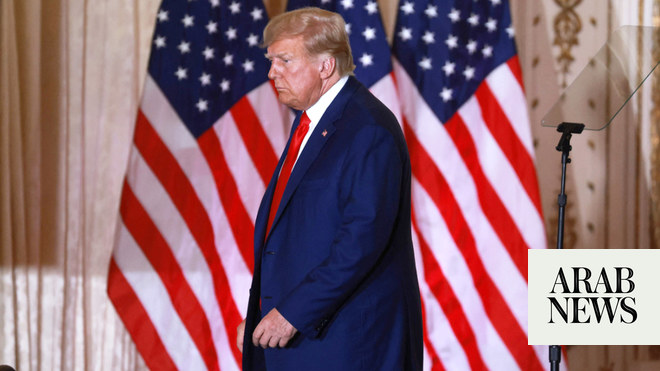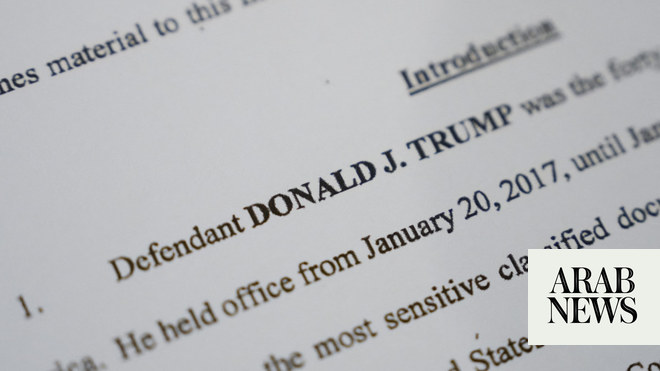
LIV Golf: Set to play for 1st time in 12 years, Anthony Kim says he’s a new person in many waysPreviousPauseNext
HomeTrump suffers twin setbacks as judges reject calls to dismiss charges
Trump suffers twin setbacks as judges reject calls to dismiss charges
Trump suffers twin setbacks as judges reject calls to dismiss charges
Pages are viewed from the unsealed federal indictment of former US President Donald Trump over his handling of classified documents. Federal Judge Aileen Cannon on Thursday rejected a move by Trump"s lawyers to throw out the case. (Getty Images via AFP)
Short Url
https://arab.news/2yrxu
Updated 35 sec ago
REUTERS
AP
April 05, 2024
01:56
157
Follow
Georgia judge rejected Trump’s bid to dismiss criminal charges in the state’s 2020 election interference case against him, which Trump argued violate his free speech rights
A Florida judge likewise rejected Trump"s bid to throw out the classified documents prosecution against him on the basis of his argument that they were his personal records
WASHINGTON: Donald Trump suffered a pair of legal setbacks on Thursday as judges spurned his calls to dismiss criminal charges over the former US president’s efforts to overturn his 2020 loss in Georgia and his keeping classified records after leaving office.
Separately, one of the Republican presidential candidate’s allies, former Justice Department official attorney Jeffrey Clark, faced the risk of disbarment after a Washington panel found he violated some attorney ethics rules in his attempts to enlist the agency to help overturn Trump’s loss.
Those cases represent just some of the legal entanglements facing Trump, who has been criminally charged in four cases as he challenges Democratic President Joe Biden in the Nov. 5 election, with the first-ever trial of a sitting or former US president due to get underway in New York on April 15.
“It just shows that everything’s moving forward,” said Amy Lee Copeland, a former federal prosecutor in Georgia, who noted that progress in many of the cases remains slow.
Florida-based US District Judge Aileen Cannon on Thursday rejected Trump’s argument that the case accusing him of illegally holding onto classified documents should be thrown out on the basis of his argument they were his personal records rather than government property.
Trump had argued that his retention of highly sensitive documents at his Mar-a-Lago estate in Florida after leaving office in 2021 was authorized under a US law that lets former presidents keep personal records unrelated to their official responsibilities.
Prosecutors in the case brought by Special Counsel Jack Smith have said the documents relate to US military and intelligence matters, including details about the American nuclear program, and could not be construed as personal.
In an earlier Thursday setback, a Georgia judge rejected Trump’s bid to dismiss criminal charges in the state’s 2020 election interference case against him, which Trump argued violate his free speech rights.
Fulton County Superior Court Judge Scott McAfee found that the indictment alleges statements by Trump and 14 others charged in the case were made “in furtherance of criminal activity” and are not protected by the First Amendment to the US Constitution.
Trump, who has called all four criminal indictments against him politically motivated, still has several pending challenges to the documents case, including arguments that he has presidential immunity from prosecution and that he was selectively targeted by prosecutors.
A lawyer for Trump in the Georgia case said Trump and his co-defendants disagree with the ruling. A Trump campaign spokesperson said the Florida ruling represented Cannon standing up to “intimidation,” without providing further detail.
The US Supreme Court late this month will hear arguments in his immunity claim in a federal case in Washington, D.C., related to his attempts to overturn his election defeat.
Trump has delayed trials in three of the four criminal cases. It is unclear if any besides the one in New York will reach a jury before the November election.
Classified documents probe
In the Florida case, Judge Cannon turned aside defense arguments that a decades-old law permitted the former president to retain the sensitive records after he left office.
Lawyers for Trump had cited a 1978 statute known as the Presidential Records Act in demanding that the case, one of four against the presumptive Republican nominee, be tossed out before trial. That law requires presidents upon leaving office to turn over presidential records to the federal government but permits them to retain purely personal papers. Trump’s lawyers have said he designated the records as personal, making them his own property, and that that decision can not be second-guessed in court.
Prosecutors on special counsel Jack Smith’s team countered that the law had no relevance to a case concerning the mishandling of classified documents and said the files Trump is alleged to have hoarded at his Mar-a-Lago estate in Palm Beach, Florida were unquestionably presidential records, not personal ones, and therefore had to be returned to the government when Trump left the White House.
Cannon, who heard arguments on the dispute last month, permitted the case to proceed in a three-page order that rejected the Trump team claims. She wrote that the indictment makes “no reference to the Presidential Records Act” nor does it “rely on that statute for purposes of stating an offense.” The act, she said, ”does not provide a pre-trial basis to dismiss” the case.
The ruling is the second time in three weeks that Cannon has rebuffed defense efforts to derail the case. It represents a modest win for Smith’s team, which has been trying to push the prosecution forward to trial this year but has also expressed mounting frustration, including earlier this week, with Cannon’s oversight of the case.
Other Trump motions to dismiss the indictment remain unresolved by the judge, the trial date is in flux, and additional legal disputes have slowed the progress of a case that prosecutors say features voluminous evidence of guilt by the former president.
In Thursday’s ruling, Cannon also defended an order from last month that asked lawyers for both sides to formulate potential jury instructions and to respond to two different scenarios in which she appeared to be continuing to entertain Trump’s presidential records argument.
The order puzzled legal experts and drew a sharp rebuke from Smith’s team, with prosecutors in a filing this week calling the premises the judge laid out “fundamentally flawed” and warning that they were prepared to appeal if she pushed ahead with jury instructions that they considered wrong.
“The Court’s Order soliciting preliminary draft instructions on certain counts should not be misconstrued as declaring a final definition on any essential element or asserted defense in this case,” Cannon wrote. “Nor should it be interpreted as anything other than what it was: a genuine attempt, in the context of the upcoming trial, to better understand the parties’ competing positions and the questions to be submitted to the jury in this complex case of first impression.”
Still, she said, if prosecutors were demanding that jury instructions be finalized prior to trial and the presentation of evidence, “the Court declines that demand as unprecedented and unjust.”
In addition to affirming the indictment Thursday, she also rejected a separate motion to dismiss last month that argued that the Espionage Act statute underpinning the bulk of the charges was unconstitutionally vague and should be struck down.
Cannon has yet to rule on other Trump efforts to dismiss the case, including arguments that presidential immunity shields him from prosecution and that he has been subject to “selective and vindictive prosecution.”
Trump is facing dozens of felony counts related to the retention of classified documents, according to an indictment alleging he improperly shared a Pentagon “plan of attack” and a classified map related to a military operation. Authorities say the records were stowed in dozens of boxes haphazardly warehoused at Mar-a-Lago, which was searched by the FBI in August 2022 in an escalation of the investigation.
The case was initially set for trial on May 20, but Cannon heard arguments last month on a new date without immediately setting one. Both sides have said they could be ready for trial this summer, though defense lawyers have also said Trump should not be forced to stand trial while the election is pending.
Smith’s team has separately charged Trump with plotting to overturn the results of the 2020 presidential election, a case delayed by a Supreme Court review of his arguments that he is immune from federal prosecution. Prosecutors in Fulton County, Georgia, have also charged Trump with trying to subvert that state’s election, though it remains unclear when that case will reach trial.
Jury selection is set for April 15 in Trump’s hush money criminal trial in New York.
That case centers on allegations that Trump falsified his company’s internal records to hide the true nature of payments to his former lawyer Michael Cohen, who helped Trump bury negative stories during his 2016 presidential campaign. Among other things, Cohen paid porn actor Stormy Daniels $130,000 to suppress her claims of an extramarital sexual encounter with Trump years earlier.
Trump has pleaded not guilty and denied having a sexual encounter with Daniels.




